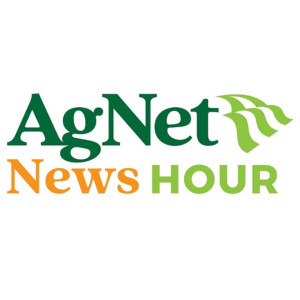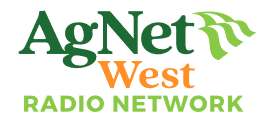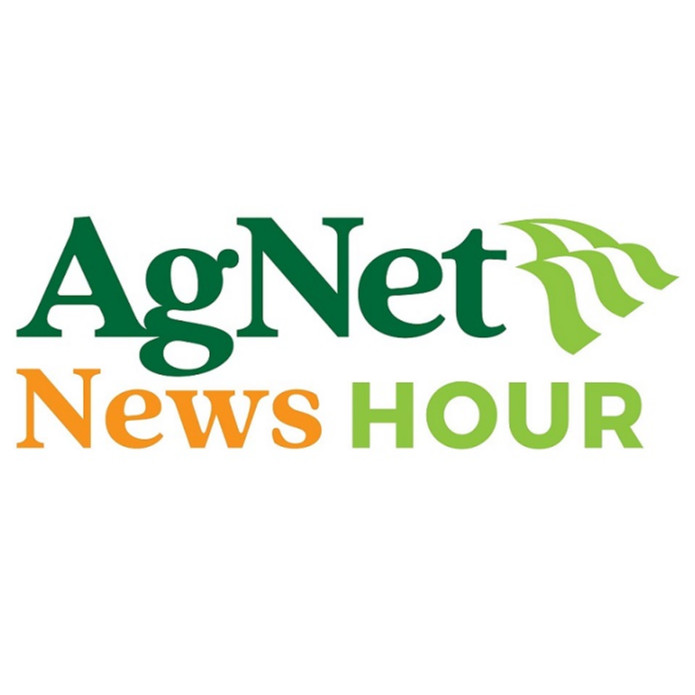Episodes
Episodes



Monday Apr 07, 2025
AgNet News Hour Monday, 04-07-25
Monday Apr 07, 2025
Monday Apr 07, 2025
Lorrie Boyer and Nick Papagni, The AgMeter,” hosts of the Ag Net News Hour , discussed recent severe weather in the Midwest and South, including tornadoes and flooding, and its impact on agriculture. The USDA announced new agricultural trade promotion programs for 2025, including the Market Access Program (MAP), Foreign Market Development Program (FMD), Technical Assistance for Specialty Crops Program (TASC), and the Emerging Markets Program (EMP). These programs aim to open new markets and support exports. The conversation also touched on the loss of 2614 gigatons of soil moisture between 2020 and 2016, affecting global temperatures and sea levels, and the potential impact on agriculture in various regions.
In this segment, Lorrie and Nick focused on the impact of Mexican gray wolves in New Mexico and California. New Mexico is declaring a state of emergency due to wolves attacking livestock and pets, with 99 confirmed livestock kills in 2024. California's gray wolf population is growing, with five of seven packs meeting breeding criteria. The conversation highlighted the challenges of wolf reintroduction, including the need for better management and the potential conflict between environmentalists and local communities. Both states are grappling with the balance between conservation and the safety of livestock and residents.
In the last segment of the Ag Net News Hour, Lorrie and Nick discussed Project Nexus, California's first solar covered canal, which generates electricity while conserving water. The initiative, funded by a public-private academic partnership, includes solar panels over Turlock Irrigation District canals. The project reduces evaporation, improves water quality, and cuts maintenance costs. It could supply enough electricity to power 2 million homes annually. The hosts also touched on the benefits of agrivoltaics, the challenges of solar panels on farmland, and the upcoming Citrus Specialty Crop Expo in Tampa, Florida, aimed at fostering collaboration among citrus growers. Listeners are encouraged to email comments, topic suggestions and feedback to nick@agnetmedia.com.



Friday Apr 04, 2025
AgNet News Hour Friday, 04-04-25
Friday Apr 04, 2025
Friday Apr 04, 2025
The Ag Net News Hour’s Lorre Boyer and Nick Papagni, “The AgMeter” started out the show by discussing the recent tariff announcements by the Trump administration, highlighting the complexities and reactions from various countries. Trump imposed a minimum 10% tariff on at least 60 countries, with specific rates including 34% on China, 24% on Japan, and 20% on the EU. Ford Motor Company is moving four factories back to the U.S., creating 25,000 jobs. The EU is considering a response to steel and aluminum tariffs. Senator Alex Padilla criticized Trump's tariffs, claiming they will harm U.S. families, while Nick argued they support farmers. The conversation also touched on the impact on the dairy industry, particularly with Canada.
In the second segment of the Ag Net News Hour, Nick and Lorrie talk about the impact of severe weather in the Midwest and South, including tornadoes and flooding, and its potential effects on agriculture. The USDA announced new agricultural trade promotion programs for 2025, including the Market Access Program (MAP), Foreign Market Development Program (FMD), Technical Assistance for Specialty Crops Program (TASK), and Emerging Markets Program (EMP). These programs aim to open new markets and promote exports. Brooke Rollins will lead trade missions to Vietnam, Japan, India, Peru, Brazil, and the UK. Additionally, a study by Australian and South Korean researchers found a significant loss of soil moisture between 2020 and 2016, affecting global climate patterns and sea levels.
The USDA has designated April as Invasive Plant Pest and Disease Awareness Month, emphasizing citizen-driven strategies to protect crops from diseases and invasive pests. The campaign highlights three key points: staying informed about local quarantines, inspecting and cleaning outdoor gear, and sourcing domestically. Additionally, the USDA encourages reporting any unusual pest activity. The discussion also touched on the importance of local hardware stores for agricultural advice and the impact of tariffs on markets. The segment concluded with a mention of Josh F.W. Cook's appointment as EPA Regional Administrator for the Pacific Southwest.



Thursday Apr 03, 2025
AgNet News Hour Thursday, 04-03-25
Thursday Apr 03, 2025
Thursday Apr 03, 2025
The Ag Net News Hour’s Lorre Boyer and Nick Papagni, “The AgMeter” started out the show by discussing the latest agriculture news, focusing on weather and drought concerns. California is experiencing better rainfall and snowpack levels, but faces water storage issues. The Purdue University/CME Group Ag Economy Barometer fell 12 points to 140, with 43% of farmers citing trade policy as their top concern, surpassing interest rates. The farm capital investment index dropped to 54, while farmland value expectations remained cautiously optimistic. The survey revealed a shift in priorities post-election, with trade policy becoming more important. The hosts debated the impact of tariffs on agriculture, emphasizing the need for a level playing field and the potential long-term benefits despite current uncertainties.
In this segment of the show, Nick and Lorrie focused on the Trump administration's federal layoffs and a lawsuit by California's Attorney General Bonta, joined by 20 attorneys, challenging the mass terminations of federal probationary employees. The lawsuit, supported by a temporary restraining order, aims to reinstate employees from 18 federal agencies, including the U. S. Department of Agriculture. The conversation also touched on a proposed bill in Congress, the Honor Farmers Contracts Act, which seeks to unfreeze USDA funding and ensure farmers are reimbursed for contracts. The bill addresses the impact of frozen funding on farmers' investments, particularly in specialty crops.
In today’s Almond Board of California feature, ABC’s Taylor Hillman had an interview on the California Almond Stewardship Platform (CASP) and its new incentive- linking to the NRCS Conservation Stewardship Program (CSP). Michael Roots, Manager of Field Outreach and Education at the Almond Board of California, explained that CSP offers per-acre payments for soil health practices like cover crops and dust protection. The new CASP report simplifies the application process by translating farm practices into NRCS codes. CASP also benefits growers with tools like irrigation and nitrogen calculators, and data sharing with handlers. The segment also touched on the importance of prunes in California, noting that nearly 100% of U.S. prunes are grown there.



Wednesday Apr 02, 2025
AgNet News Hour Wednesday, 04-02-25
Wednesday Apr 02, 2025
Wednesday Apr 02, 2025
On the first part of the show, Nick Papagni, "The AgMeter" discuss the impact of tariffs on the shipping industry with Jeff Cox from Best Drayage Ocean Shipping. Cox explains that his company specializes in moving containers in and out of ports, particularly in Oakland and Long Beach. He highlights the challenges posed by tariffs, including potential spikes in import volumes and increased costs, which could affect freight demand. Cox also notes the significant difference in costs between U.S.-built ships and foreign-built ships, with U.S. ships costing up to eight times more. The conversation touches on the broader implications of tariffs and the Trump administration's efforts to level the playing field in international trade.
The Ag Net News Hour Hosts, Lorrie Boyer and Nick "The AgMeter" discuss the rise of female farmers in the U.S., citing a USDA survey analyzed by Trace One. The survey revealed that 36.3% of U.S. farmers are women, managing 407 million acres and contributing $222 billion in ag sales. Arizona leads with 47.9% female farm operators, while Illinois is at the bottom. The conversation also highlighted the impact of new technologies and changing societal norms on the agricultural industry, emphasizing the growing influence of women in farm management and leadership roles. The discussion concluded with a mention of the top five states with the highest percentage of female farm operators.
In line with recent discussions on the show about new technology and electric vehicles, Nick and Lorrie talk about the discovery of 18 million tons of lithium in California's Salton Sea, valued at $540 billion, which could power batteries for 382 million electric vehicles. The lithium is extracted using geothermal production wells. The conversation also touched on the outdated 2018 Farm Bill and the impact of fluctuating commodity prices on farmers. Doug Yoder, a crop insurance agency manager, highlighted the increased interest in eco-enhanced coverage options and the American Relief Act's economic assistance program, which offers payments per acre for corn, soybeans, and wheat, with initial payments capped at 85% of the stated rates.



Tuesday Apr 01, 2025
AgNet News Hour Tuesday, 04-01-25
Tuesday Apr 01, 2025
Tuesday Apr 01, 2025
The Ag Net News Hour’s Lorre Boyer and Nick Papagni, “The AgMeter” discussed the new USDA Emergency Commodity Assistance Program (ECAP), which provides financial relief to farmers affected by economic uncertainty and natural disasters. ECAP offers flat payment rates per acre for eligible commodities, with initial payments factored by 85% to manage funding. The program aims to support crop growers facing low prices, high input costs, and natural disasters. Additionally, the American Relief Act includes up to $20 billion for disaster relief. The segment also touched on a recent wildfire in central California, the Silver Fire, which has spread over 1,000 acres near Bishop.
In the second segment, Nick and Lorrie discussed the impending reciprocal tariffs, set to take effect unless last-minute negotiations alter plans. The tariffs, which could impact US-Canada trade significantly, include 263% on chicken and 279% on turkeys. Concerns were raised about the potential economic fallout, including a possible US recession and reduced demand for US agricultural exports. USDA Secretary Brooke Rollins is actively pursuing new trade deals with countries like Vietnam, Japan, India, Peru, and the UK to mitigate these effects. The conversation also touched on the strategic importance of US-Canada relations and the potential for alternative export markets.
Finally, Ag Net News Hour hosts, Nick “The AgMeter” and Lorrie Boyer discussed the Bureau of Reclamation's increase in Central Valley Project water allocations for 2025, with initial allocations at 100% for some areas and 40% for others. Despite recent above-average rainfall, West Side growers face challenges, predicting a final allocation of 60%. The conversation highlighted the political and environmental challenges in California's water management, emphasizing the need for increased water supply and reduced red tape. The hosts stressed the importance of supporting farmers and the potential impact of federal involvement, particularly under the current administration, to address these issues.



Monday Mar 31, 2025
AgNet News Hour Monday, 03-31-25
Monday Mar 31, 2025
Monday Mar 31, 2025
The Ag Net News Hour’s Lorre Boyer and Nick Papagni, “The AgMeter” started out the show by discussing California's Assembly Bill 1264, which aims to ban ultra-processed foods from school meals by 2032. These foods are linked to 32 health conditions, including obesity and ADHD. The bill faces challenges in making healthy foods appealing to children and affordable for schools. Suggestions included using fresh, local produce and innovative packaging to make healthier options more appealing. The conversation also touched on the broader issue of food waste and the importance of addressing obesity, which is influenced by both diet and sedentary activities like video games.
In the second segment, hosts, Lorrie Boyer and Nick Papagni discussed the severe impact of record honey bee deaths on agriculture, with U.S. beekeepers reporting over 60% colony losses, costing $139 million and raising honey prices. Pesticides, particularly neonicotinoids, are suspected, with multi-generational harm noted. The California almond industry, worth $11 billion, faces severe pollination shortages. Despite concerns, some argue that more bee companies indicate a future surplus. The University of California is studying long-term effects on pollinator populations. The hosts emphasized the importance of due diligence and ongoing research to address the issue.
Lastly, Nick brought up the impact of recent storms on California's water allocation, with the Department of Water Resources increasing water to state projects to 40%. Nick criticized the 40% allocation, noting that much water goes to the ocean, while farmers struggle. They also discussed the challenges of using ocean water for firefighting due to salinization. Additionally, Nick ad Lorrie addressed a controversial wind energy project in Shasta County, which could generate 205 megawatts but faces opposition due to environmental and safety concerns. The project would benefit 80,000 homes, but local opposition has spent significant funds fighting it. Lorrie cited some issues with wind farms and wind turbines based upon her prior coverage in other areas of the country.



Friday Mar 28, 2025
AgNet News Hour Friday, 03-28-25
Friday Mar 28, 2025
Friday Mar 28, 2025
Lorrie Boyer and Nick Papagni, “The AgMeter” discuss the Waters of the US (WOTUS) rule under the Clean Water Act with Mary-Thomas Hart, Chief Counsel of the National Cattlemen's Beef Association (NCBA). Thomas-Hart highlights that farmers and landowners have faced 14 iterations of WOTUS since 1972. Recent developments include EPA Administrator Lee Zeldin's announcements on enforcement and a 30-day Request for Information. The Supreme Court's 2023 decision declared the significant nexus test unconstitutional. NCBA aims to ensure EPA aligns with the Supreme Court's intent. Thomas-Hart emphasizes the importance of public comments and collaboration with agencies like the US Army Corps of Engineers and USDA to avoid unintended harm to cattle producers.
The discussion on the Ag Net News Hour continued on the Waters of the US under the Clean Water Act, emphasizing the need for clear definitions to avoid federal jurisdiction over agricultural land. California's water issues were highlighted, with concerns about water allocation and environmental policies favoring fish over human needs. The conversation also touched on the potential benefits and risks of genetically modified soybeans and corn, noting that 90% of soybeans and corn are genetically modified. The debate includes the impact of GMOs on human health and the role of the Food and Drug Administration in ensuring food safety.
In the last segment, Nick Papagni and Lorrie Boyer discussed the growing gray wolf population in California, which has led to cattle depredation, prompting a local emergency in one county. Between October and December 2024, wolves killed 19 cattle in rural counties. The issue mirrors that in Colorado, where wolves were reintroduced via a ballot measure. The conversation highlighted the challenges farmers face, including financial losses and the fear of reporting losses due to potential harassment from environmentalists. California has a $3 million compensation program for non-lethal deterrence measures.



Thursday Mar 27, 2025
AgNet News Hour Thursday, 03-27-25
Thursday Mar 27, 2025
Thursday Mar 27, 2025
Nick Papagni, the "AgMeter" starts the show off with a feature interview on cherries with Morada Produce Company's Michael Jameson. Produce discussed the upcoming cherry season, noting that California produces over 2.2 million boxes of cherries. He highlighted the challenges in estimating crop volumes due to the bloom stage and the impact of weather on pollination. Jameson emphasized the importance of accurate timing for retailers and the use of advanced technology like optical sorters for quality control. He also addressed the impact of tariffs and exchange rates on export markets, noting that 71% of the crop goes to the domestic market, with 29% to international markets. Jameson stressed the need for a strong domestic foundation due to the volatility of international markets.
The AgNet News Hour hosts discussed the Trump administration's release of billions for rural energy projects, emphasizing the need for grant recipients to rewrite their funding purposes to align with the administration's energy goals. The Rural Energy for America Program (REAP), which supports rural energy projects, has been on hold due to litigation. The conversation also touched on the removal of DEIA and climate mandates from grant applications. Additionally, the hosts critiqued the Biden administration's Inflation Reduction Act, noting its bureaucratic complexity. The segment concluded with a discussion on the impact of California's gray wolf population on agriculture.
In this week's Almond Board of California feature, we talk about the importance of getting involved in the Almond Board of California. Their call for candidates deadline for the Board of Directors election is April 1, but Committees will be held in July. Justin Morehead is a current Board Member and is on committees.

AgNet News Hour by AgNet West
Listen in to our farm news show featuring the best in local, statewide & national reports, along with feature stories & in-depth interviews covering all topics of California agriculture. Hear from Sabrina Halvorson and Brian German along with expert contributors and ag leaders with all the day's agricultural news.




